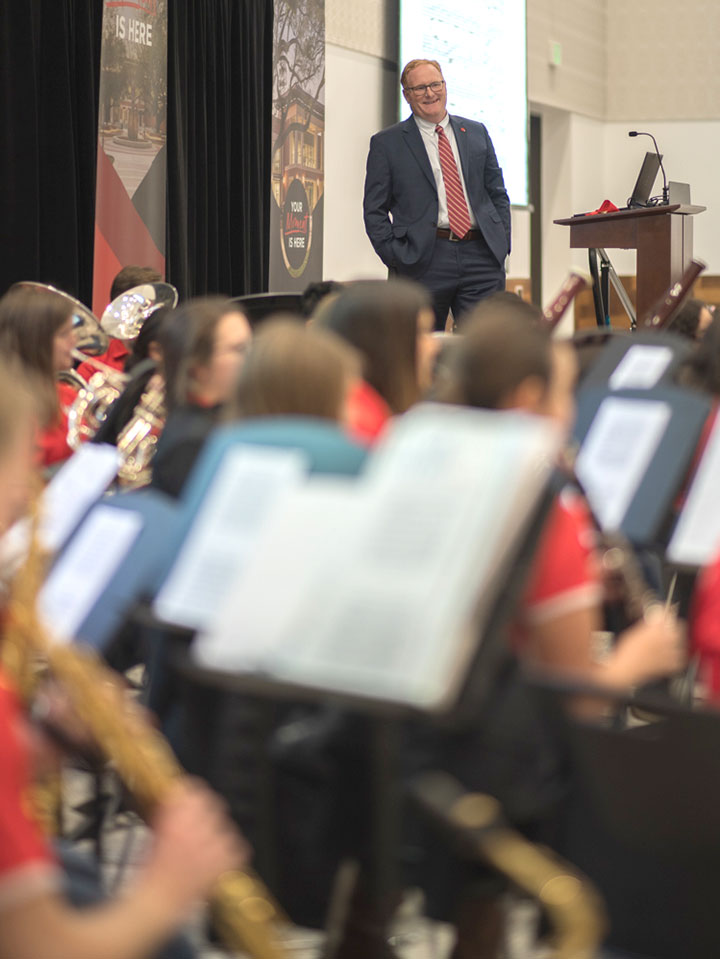
Proksch presents Distinguished Faculty Lecture
Bryan Proksch, Lamar University associate professor of music history, presented the 2019 Distinguished Faculty Lecture, Nov. 12, in the Live Oak Ballroom of the Setzer Student Center.
Proksch’s research focused on the cultural and educational impact the Magnolia Petroleum Band and John Phillip Sousa had on Beaumont history.
“There was time when (company) bands were a big deal in the United States,” Proksch said. “Bands were a part of the fabric of American society. From about the end of the civil war, all the way to the depression, bands dominated the musical landscape. Bands fostered a strong sense of patriotism, national and civic pride, and community participation. By the 1880s, every little corner of the nation had a least one band.”
Although these bands were the dominant form of music and the backbone of many towns’ musical culture, they were made up mostly of amateur players.
“The Magnolia Petroleum band members were a ragtag bunch of refinery workers, and their company dentist, Harry Cloud, was their director,” Proksch said. “The Magnolia Refinery had replaced drilling as a primary economic driver and was one of the largest employers in the city.”
Band magazines began placing want ads from companies trying to recruit people, even though bands did not bring money into the company.
“There were, of course, benefits to brand recognition by having a band with your patch on their uniforms playing around town,” Proksch said. “Nearly all these companies thought of these bands as means to improve the lives of their employees, not as a means to improve their bottom line. The executives knew the bands would cost money, but would never offer any kind of tangible benefit to their bottom line. Yet these band not only existed — they flourished.”
The Magnolia Petroleum Band was quickly recognized as a premier ensemble of its kind in Texas. John Phillip Sousa, “The March King” and a celebrity of American popular music, saw the potential offered by the union between capitalism and company musicians, such as the Magnolia Petroleum Band.
“‘The March King’ himself conducted an ensemble for a new time promotional concert on January 22, 1924, while touring through Beaumont with his own Sousa band,” Proksch said. “The Magnolia Band played so well for Sousa that he thought the bandsmen, all of whom were full-time refinery workers and amateurs, were actually professionals playing a prank on him by greasing up and coming to the concert in overalls.”
Sousa played the “The Magnolia Blossom,” written by Harry Cloud, at one of his concerts to boost ticket sales and civic pride.
“‘The Magnolia Blossom’ itself is a well written march, especially considering that Harry Cloud was the company dentist and he was just a musician on nights and weekends only,” Proksch said.
Members of the Lamar University marching band played “The Magnolia Blossom” during the lecture.
The earliest reference to music concerning the Magnolia Petroleum Band can be found in the corporate newsletter of the Magnolia Refinery: The Mag Petro, published in April of 1920.
“With music increasingly on their minds, the Mag Petro editor included an essay about the power of music in one of the issues,” Proksch said. “He noted it encouraged expression of common feeling and uplifted one’s character. The Magnolia Band was in a symbiotic relationship with its parent corporation and its town’s people.”
The founding of the Magnolia Petroleum Band coincided with the growing importance of radio broadcasting, and for the majority of the ’20s, the Magnolia Petroleum Company’s interest in band and radio created an immediate and successful partnership.
“The band made its first trip outside of Beaumont in October of 1923 to present a concert at corporate headquarters in Dallas, where thousands heard the band play during the fair and more still heard the band play a concert on WFAA — a new, clear channel a.m. station owned and operated by the Dallas morning news,” Proksch said.
A publicity contest by the station, for the most distant winner, brought in more than 1,000 letters from 44 of the then 48 states. The bands success on WFAA led to two more transmissions and another contest that received 1,788 letters.
“On October 21, 1924, less than a year later, the band made local radio history by playing the inaugural broadcast of Beaumont’s first a.m. radio station, KFDM,” Proksch said. “The station was directly owned by Magnolia Petroleum and the call sign stood for its motto, ‘Kall For Dependable Magdolene.’ The band quickly became a staple on the station, transmitting weekly concerts to listeners in the region for the remainder of the decade.”
In the beginning of 1925, the band began annual tours of east Texas and western Louisiana. During one of their 33-hour trips, the band managed to perform more than 100 short concerts in towns they passed through.
“The most visible evidence of the importance of the band was the extent to which they were imitated,” Proksch said. “The key factor in the demise of not only the Magnolia Band but all company bands was the onset of the Great Depression.”
Proksch said, the key feature for the band was the amount of civic and corporate pride they generated.
“In towns like Beaumont, where residents had little access to classical music and live performance, bands served exactly this educational function, and were seen as a way for area to make up for the deficiency in cultural opportunities available in the big cities like Houston and Dallas,” he said. “The trophies and medals meant something, and Beaumont took pride in their award-winning band.”
The Distinguished Faculty Award is sponsored by Total Petrochemicals and Refining USA, Inc.
